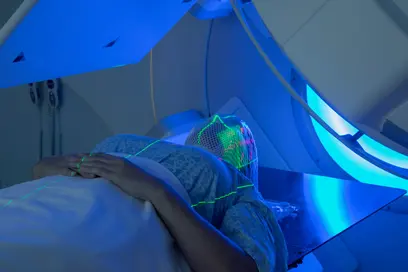For several years, doctors have been using a new type of immunotherapy to treat certain cancers of the blood and lymphatic system, sometimes achieving significant treatment successes: for so called CAR T-cell therapy, the patient's own T-cells are collected and genetically engineered outside the body with a receptor that recognizes a target structure on the surface of the malignant leukaemia cells. In most cases, this target structure is the protein CD19, which all cancer cells in B-cell leukemias and lymphomas display on their surface.
The CAR-T cells are then multiplied and transferred back to the patient - where they begin to hunt for cancer cells. However, in some patients the therapy does not have the desired effect or fails after a short time. The reasons for this may be that the cancer cells lose their target molecule CD19, that the CAR-T cells are exhausted or that they do not multiply sufficiently in the patient's body.
Oncologists are currently trying to improve the therapeutic effects in clinical trials by combining the CD19 CAR T cells with CAR T cells that are directed against the B cell-specific protein CD20. In addition, bispecific antibodies that recognize CD20 on the one hand and a T-cell-specific molecule with their second binding site are already being tested in patients in whom CD19-CAR-T cell therapy has failed. In this way, the antibodies bring leukemia and T cells together, enabling the immune cells to kill the cancer cells.
“We hypothesized that the combination of CAR-T cells and bispecific antibodies has a dual effect: The antibodies can increase the punch of the CAR T cells and they presumably additionally activate other T cells of the patient against the leukemia,“ says Martina Seiffert from the DKFZ. Her team tested this hypothesis together with researchers led by Sascha Dietrich from the UKHD using cells in the culture dish and a mouse model.
In co-culture experiments, the combination of CD19-CAR T cells plus bispecific CD20 antibodies killed significantly more malignant B cells and also increased the proliferation of both normal T cells and CAR-T cells.
In a mouse model of chronic lymphocytic B-cell leukemia (CLL), the combination proved to be more effective than monotherapy in eliminating leukemia cells. The combination therapy was able to completely repress the blood cancer in 80 percent of the animals. In contrast, CD19-CAR-T cell monotherapy only led to a permanent reduction in blood cancer cells in 20 percent of the animals.
Functional analyses showed that the bispecific anti-CD20 antibody increased the activation markers in both CAR-T cells and normal T cells. In normal T cells, it also promoted proliferation and cytotoxicity.
“The results convincingly demonstrate the advantage of combining CAR-T cells with the bispecific antibody. The combination therapy improves the efficacy of CAR T cells in animal experiments and simultaneously activates other T cells against the blood cancer,“ says Martina Seiffert.
Bispecific antibodies specific for CD20 are already approved for the treatment of certain lymphomas. “The combination therapy could be a promising treatment alternative for CLL patients who do not respond to conventional therapies,“ says Sascha Dietrich. Whether this treatment concept is also successful in humans still needs to be tested in clinical trials.
Since both CAR T-cell therapy and bispecific antibodies can be associated with severe side effects in patients, it was important to test the treatment sequence preclinically. The treatment studies in the CLL mouse model have shown that the combination therapy is very well tolerated by the animals - a valuable indication for planning clinical trial as safe as possible.
Berit J Brinkmann, Alessia Floerchinger, Christina Schniederjohann, Tobias Roider, Mariana Coelho, Norman Mack, Peter-Martin Bruch, Nora Liebers, Sarah Dötsch, Dirk H. Busch, Michael Schmitt, Frank Neumann, Philipp M. Roessner, Martina Seiffert, Sascha Dietrich:
CD20 bispecific antibodies improve response to CD19 CAR T cells in lymphoma in-vitro and CLL in-vivo models
Blood 2024, DOI: 10.1182/blood.2023022682



